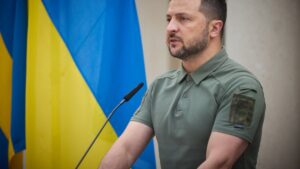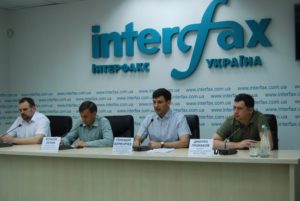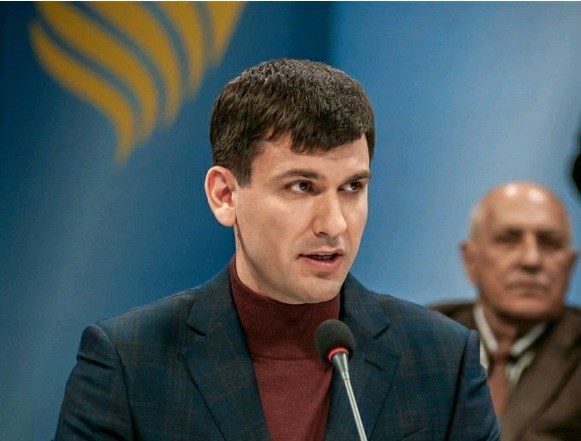
The issue of resetting the government in Ukraine depends on the financial deficit, Ukrainian President Volodymyr Zelenskyy said at a press conference in Kyiv on Sunday.
“We have a conversation with the Prime Minister. And it is based solely on the deficit of money. If the corresponding deficit continues, we will do everything to ensure that the infrastructure, and this is not just the Cabinet of Ministers, that the infrastructure of our state’s management is reduced,” he said.
“Reducing the number of ministries, reducing the number of ministers, coordinated management. That is why we have an absolutely open dialog here, and we are ready for it. I think the indicator will be an understanding of what we will have in the spring. A little later, in a month or two, we will understand everything,” Zelensky said.

IDP organizations, political experts call to reboot Minsk process
On May 28, 2019, Interfax Ukraine’s press center hosted a press conference entitled: “Rebooting the Minsk Format: New Faces.”
During the press conference, experts noted the need to speed up staffing the Minsk Group with new capable personnel, on the one hand, who can articulate Ukraine’s position in the negotiation process more clearly and, on the other hand, unfreezing the dialogue on the exchange of prisoners of war, the killed and the search for missing people.

Head of the Public Council under the Ministry for Temporarily Occupied Territories and Internally Displaced Persons (IDPs) Hennadiy Borisichev said: “In the conditions of withdrawal of a number of key figures from the group, against the backdrop of intensified hostilities in Donbas and the capture of eight Ukrainian soldiers, the absence of Ukrainian representatives on the only legitimate communication platform endangers the lives and health of our citizens living in territories not controlled by Ukraine and captives.”
At the same time, he expressed the readiness of the Public Council under the Ministry for Temporarily Occupied Territories and Internally Displaced Persons, which consists of 26 public organizations, and IDPs organizations whose members are former residents of Donbas to cooperate with the administration of the new president, denoting that the “Public Council under the Ministry for Temporarily Occupied Territories and Internally Displaced Persons has a sufficient personnel and project resource capable, in our opinion, of reviving the Minsk process upon condition of its depoliticization.”
“Human rights activists, unlike politicians, are not politically biased, we are guided by the interests of war-affected people. The state should delegate at least some of the areas in the Minsk process to people who are vitally interested in supporting Ukrainian citizens on both sides of the contact line.”
“In addition to work at the Public Council under the Ministry, I head the union of IDP organizations ‘All-Ukrainian Platform of Donbas (‘Donbas Platform’).’ We represent more than 1.38 million IDPs whose position has been ignored. Who, if not us and our experts, could represent Ukraine at the Minsk process? Today not a single expert representing internally displaced people and other victims of the war was involved in the work of the Minsk Trilateral Contact Group to resolve the situation in the Donbas, the appointment of Ukraine’s envoys still remains non-transparent, which results in mistrust of a significant part of society in this process and reduces the effectiveness of the talks, ” Borisichev said.
Head of NGO Rada of Peace Initiatives Ivan Gunya outlined a number of problems noted by residents of the temporarily occupied territories, which are only aggravated by certain provisions of the Minsk agreements. In particular, the requirement of “total amnesty” for participants in illegal armed formations would cause internal conflicts in the ORDLO [occupied districts in Donetsk and Luhansk regions]. First of all, between the victims of the occupying authorities and representatives of the “amnestied” occupying administrations.
“The amnesty process requires an individual approach, the amnesty cannot be extended to the military who committed serious crimes. First of all, ordinary citizens must now benefit from our efforts,” Gunya said.
Director of Center for Civil Society Studies Vitaliy Kulyk added that the new authorities need to understand that the war that the Russian Federation has been waging against the Ukraine, occupying territories, should not become part of the electoral process. The situation does not tolerate the slightest inaccuracy in the wording. “What works well in campaign materials has nothing to do with the conflict.” The expert spoke out against the soonest peace on the terms of the Russian Federation – with the loss of Crimea, the immediate return of the ORDLO under Ukraine’s nominal control – on the terms of “broad autonomy and federalization.”
Head of RAND Research Projects Dmytro Hromakov noted that despite the constant mantras of politicians about the desire of Ukrainians for peace and the importance of the end of the war in Donbas to them, which is seen in all sociological research, it should be noted that the majority do not need peace at any cost. Most Ukrainians are not ready for “peace through defeat” and any action by the authorities in this direction will only lead to another iteration, if not a forceful change of power, then precisely to the emergence of revanchist movements and, as a result, another conflict of interests between the government and society.
According to a February poll by the Razumkov Center, 59% of respondents are convinced that peace in the east of Ukraine can only be achieved under conditions acceptable to Ukrainian society. At the same time, 29% of respondents are in favor of establishing peace at any cost, 11% were undecided.
The key problem of the Minsk process for Ukraine is the need to solve simultaneously two tasks at different levels within the same platform. On the one hand, to put the Russian Federation at the negotiating table as an officially recognized party within the framework of international law, which requires serious diplomatic efforts by the new administration at global platforms (UN, PACE, the OSCE, EU). On the other hand, today we need to solve the current problems of our citizens living in the occupied areas, victims of this conflict. It is necessary to form channels and areas of communication between those residing in the ORDLO and the rest of Ukraine. The current situation creates difficult communication for the public legitimization of any decisions at the Minsk talks, since a compromise is always easy to be used as a factor for the so-called “zrada” [literally “treason,” “treachery,” “betrayal” – when the public sees a decision as the betrayal of its interests] and trolling directed towards the current administration.